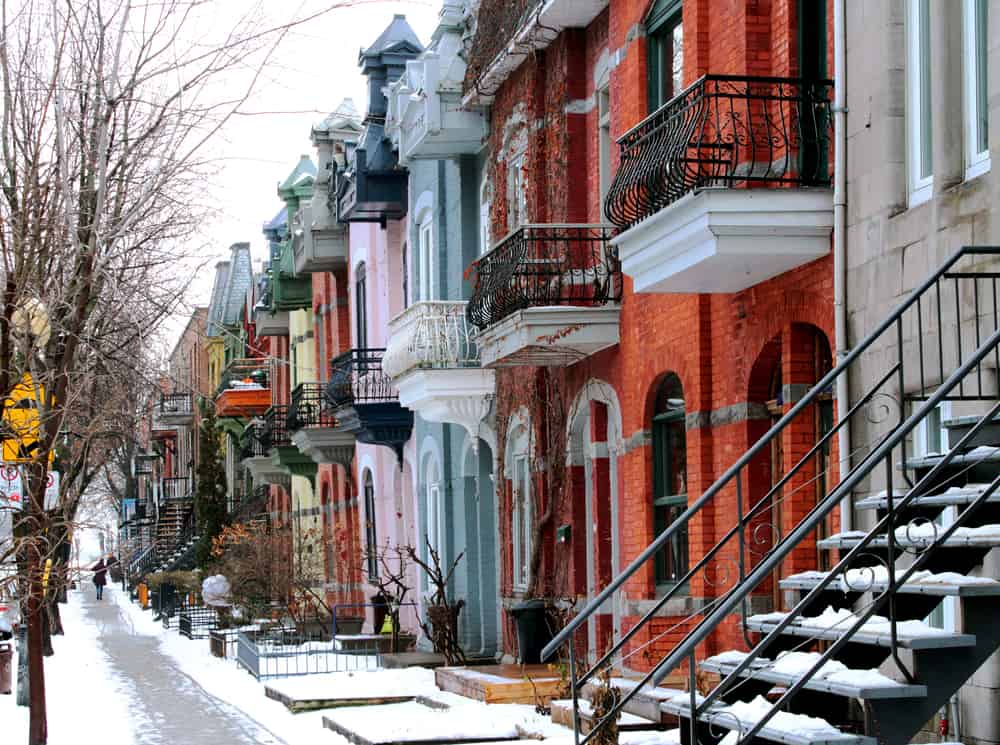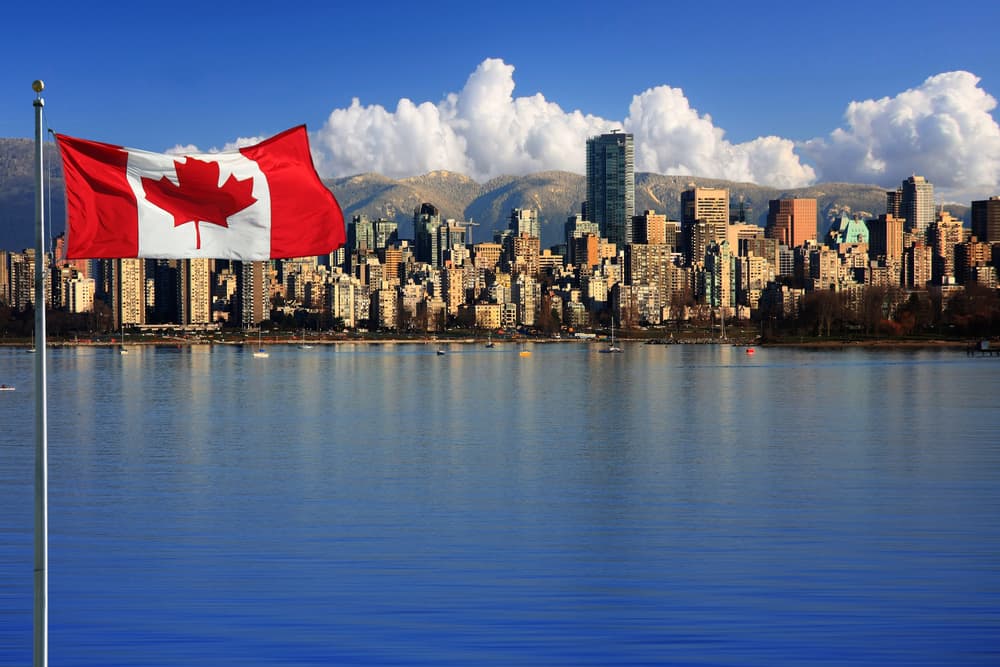
Canada is a multicultural society with a high quality of life and a great education system. It’s also considered to be one of the safest countries in the world. The Canadian job market is recovering quickly after COVID restrictions and immigration is booming. Canada’s stunning scenery is a big drawcard for many people.
If you are considering moving to Canada, the various costs listed below will help you make an informed decision on what costs are involved when moving and living in this part of North America.
Quick Canadian Facts:
- Population: 38,654,738 (2022 estimate)
- Official Language: Canada has two official languages – English and French but the majority of Canadians are English speaking. Punjabi, Mandarin and Spanish are the most common languages spoken outside English and French. There are also eleven indigenous language groups.
- GDP Per Capita: $57,834 CAD
- Trans-Canada Highway: This is one of the longest highways in the world – 4,860 miles long. It crosses six time zones, going through the Rockies, wilderness, national parks, amazing cities, woodlands, lakes and rivers.
- Currency: Canadian Dollar (CAD). As of August 2022, £1 = $1.54, €1 = $1.30, $1 US$ = $1.30, $1 AUD = $0.89
1. Moving and Shipping Costs to Canada
Sample International container shipping costs to Canada from various other countries.
You can see a more complete breakdown of Container Shipping Rates To & From Canada here.
2. Canadian Housing Costs

The majority of Canadians own their homes, with one in three people renting. The cheapest province for rentals is New Brunswick and the most expensive are British Columbia and Ontario.
Monthly Rental Prices in Canada
- 1 bedroom apartment in City Centre: C$941 – C$2,300
- 1 bedroom apartment outside the City Centre: C$900 – C$2,000
- 3 bedroom apartment in City Centre: C$1,561 – C$4,483
- 3 bedroom apartment outside the City Centre: C$1,492 – C$3,200
- Price per square metre (10.7 square feet) to buy in City Centre: C$4,305 – C$15,069
- Price per square metre (10.7 square feet) to buy outside City: C$3,220 – C$11,431
Canadian Housing Cost Comparison
This is how rents in Canada compare with other countries around the globe.
United Kingdom is 13.94% cheaper
United States is 33.94% more expensive
Australia is 1.15% more expensive
Singapore is 90.92% more expensive
France is 30.71% cheaper
UAE is 2.76% cheaper
Spain is 40.45% cheaper
Source: Numbeo
How to Save on Housing Costs
- Share an apartment or house. Have a look at the following sites to find your perfect room or flat mate: iRoommates, 10 Good Sites, Kijiji, Rentola, Minto and Nestpick.
- Different regions – different prices. The housing costs in different provinces varies considerably. They also vary within provinces from city to city, and also within different neighbourhoods in the same city. New Brunswick is considered to be the cheapest province to live in, with Ontario and British Columbia being the most expensive.
3. Canada Food, Grocery and Restaurant Costs
Canadians are extremely proud of their dining scene. You’ll find a wide array of restaurants from fine dining restaurants which concentrate on using locally acquired ingredients, to cafes which serve the best (and perhaps your first) poutine you’ve ever tasted. Canada has the world’s longest coastline so it’s not surprising that fish features highly in supermarkets and restaurants.
- Inexpensive Restaurant: C$15 – C$40
- Takeout Coffee: C$2.50 – C$7.00
- Bottle of Coke: C$1.75 – C$3.25
- 1L of milk: C$1.32 – C$4.89
- Loaf of Bread: C$1.98 – C$5.00
- 12 Eggs: C$2.50 – C$5.99
- 1kg Chicken Fillets: C$6.61 – C$22.02
- 1kg Beef: C$8.00– C$28.00
- 1kg Apples: C$1.99 – C$7.69
- 1kg White Rice: C$2.00 – C$8.00
This is how restaurants and food prices compare with other major cities in the world.
- UK restaurants are 4.42% cheaper and groceries are 29.70% cheaper than Canada.
- United States restaurants are 0.15% more expensive and groceries are 5.3% more expensive than Canada.
- Australian restaurants are 1.74% cheaper and groceries are 8.31% more expensive than Canada.
- Singapore restaurants are 14.69% cheaper and groceries are 5.68% more expensive than Canada.
- French restaurants are 4.26% cheaper and groceries are 8.12% cheaper than Canada.
- UAE restaurants are 18.81% cheaper and groceries are 29.39% cheaper than Canada.
- Spanish restaurants are 20.01% cheaper and groceries are 42.67% cheaper than Canada.
Source: Numbeo
Bonus Tips for Cheaper Food, Restaurants and Groceries
- Know your supermarkets: Canada has a good range of foods to suit most cultures. There are many farmers’ markets selling great fresh produce in most areas within Canada. There are also excellent health food stores which sell organic foods. Popular supermarkets in Canada are Loblaws, Metro, Sobeys, and Walmart.
- Find Cheap Eats: Canada isn’t the cheapest place to eat out but if you hunt around you will find some good restaurants that offer specials on various days of the week. Have a look at the following sites for suggestions – Style Democracy, TimeOut, Taste Toronto, Daily Hive and Buzzfeed
4. Canadian Alcohol Costs
Social drinking is part of everyday life in Canada. It’s an integral part of socialising, whether it’s watching a game of lacrosse or just enjoying an evening with friends.
- Bottle of imported beer at a restaurant/pub: C$6.00 – C$10.00
- Pint (0.5L) domestic beer at a restaurant/pub: C$4.00 – C$9.00
- Pint (0.5L) domestic beer at a supermarket: C$2.00 – C$6.00
- Bottle of imported beer at a supermarket: C$2.27 – C$7.00
- Mid-range bottle of wine at a supermarket: C$12.00 – C$25.00
How to drink for less in Canada
- Keep an eye on the local papers and flyers for cheap drinks, either in supermarkets or in bars, clubs and restaurants.
- Many bars and restaurants have Happy Hour specials after work, usually from 4pm to 7pm. One place you’ll always find cheap bars and restaurants is near colleges and universities. Look on student websites and see where they hang out. Have a look at the following sites for more tips on where to go to save money on a night out – Narcity, Four Square, Yelp and MTL Blog.
5. Canada Transportation Fares

Canada has a good transport system consisting of buses, subways, trains, ferries and planes. In the major cities, the main method of transport is bus, subway or train. The main form of transport in Canada is by car and, if you’re planning to see a lot of Canada, you’ll need a car as remote areas obviously don’t have bus or rail systems.
Here are some example ticket costs.
- Adult Single – C$2.40 – C$4.00
- Monthly season ticket, unlimited – C$75 – C$156
- Taxi start (normal tariff) – C$3.35 – C$6.50
- Taxi 1km (normal tariff) – C$1.55 – C$4.00
How to save money on public transport
- Look for free rides and free transfers from bus to rail and vice versa
- Buy a weekly ticket C$25 for 7 days of unlimited travel
- Buy a bike. Cycling is big in Canada There are cycles lanes and lots of rides in and around the cities.
- Walking is also an option. Although perhaps not recommended in winter in cities such as Quebec and Winnipeg.
6. Cost of Internet in Canada
Internet prices in Canada are expensive compared with many other countries in the world and are only marginally lower than the States. Here are some sample internet prices from August 2022 for unlimited downloads, based on a 12-month contract:
7. Cost of Clothing, Personal Items, Gym and Leisure
The average daily temperature in summer on both the west and east coasts is in the low 20s. Away from the coast the temperature rises to between 25 C and 30 C degrees, and in some areas, it can reach 40 C degrees. Winters can be exceedingly cold depending on the area you’re in, with temperatures dipping to -40 C or even lower. British Columbia is the exception to the ‘freezing’ winter rule where temperatures are generally above freezing in the winter.
The Great Prairies are the sunniest areas with over 2,300 hours of sunshine per annum. British Columbia also get a good amount of sunshine during the summer. The wettest month in Canada totally depends on where you’re living – it’s a big country.
Here are some clothing prices, together with other useful prices.
- Pair of Jeans: C$35 – C$100
- Summer Dress: C$25 – C$80
- Running Shoes (Trainers): C$70 – C$150
- Business Shoes: C$79 – C$200
- Short Doctor’s visit (15 mins): C$99
- Deodorant: C$5.66
- Shampoo: C$5.78
- Toilet Paper (4 rolls): C$3.45
- Gym membership: C$22 – C$100 per month
- Movie (cinema) ticket: C$12 – C$20
Source: Numbeo and Expatistan
8. Cost of Owning a Car and Driving a Car in Canada

Canada has an extremely effective road system, both for long distance travel and in cities. People living in the larger Canadian cities tend to use public transport rather than drive to work as, like most cities around the world, it’s much quicker.
You can drive on a foreign license for a few months as a tourist but after that you will need to get a Canadian license. In most cases this will involve a straight swap but in certain cases a driving test may be required.
All vehicles need to be registered and insured with the owner’s provincial or territorial government. Insurance costs vary considerably so it’s definitely worth doing your homework rather than committing to the first company you find.
Here are some other sample costs of owning and operating a car in Canada:
- Volkswagen Golf: C$28,000
- 1 litre (¼ gallon) of gas (petrol): C$1.70 – C$2.20
- Other fees (if any): The average cost of owning and running a car in Canada is CS750 per annum
Source: Numbeo, Reviewlution
Ways to save money driving in Canada
- Car sharing or pooling is one way to save money. Try Poparide, Carpoolworld, Uber, Luckytogo, and Youride.
- Taxis can sometimes be a cheaper option, especially if you are going to have to park all day. Try Lyft and Uber.
Need your car/vehicle moved to Canada? Then read our guide to: Car Transport & Vehicle Shipping
9. Taxes in Canada
A major factor in determining your tax liability in Canada is your residence status. A Canadian resident is taxed on his/her worldwide income, whereas a non-resident is only taxed on his/her Canadian income. To learn more about the Canadian tax system, go to Canadian taxes.
Sales tax in Canada varies from 5% to 15%, depending on the province or territory you are in. The price you see on an item does not include sales tax.
If you own your home, you will be subject to property tax based on the area in which you live and the size of the property you live in. Learn more about property tax in Canada at this government website.

10. Flight Costs from Canada
If you do make the move to Canada, here’s approximately how much it will cost to fly to other major world cities from Toronto based on lowest, one-way fares from Skyscanner as of late 2022:
- London: C$265
- Paris: C$342
- New York: C$90
- Los Angeles: C$167
- Dubai: C$428
- Sydney: C$601
- Melbourne: C$658
- Cape Town: C$925
- Hong Kong: C$759
Other Canadian Relocation Tips
The costs and pricing above should give you a good idea of the cost of living in Canada but perhaps the following extra tips will make your move go smoothly.
11. Relocating to Canada Alone
Moving is always a stressful time but moving on your own can be exceptionally difficult. Thankfully Canada is a country which is safe and welcomes newcomers. Here are a few tips about settling in Canada.
- Meetups: Canada has many Meetup groups covering a wide range of activities from skiing to fine dining.
- Attend local events: There is always something going on in every province in Canada and many of the activities are free. Have a look at the following sites for inspiration – Trip Adviser, Canadian Living, Escape and Travel Marvel.
12. Moving to Canada with a Family
Canada is an extremely family-friendly country. There are so many activities for families, from skiing to surfing, from museums to theme parks and everything in between.
- New parents (or parents to be): Check out Mommy Connections and The Mothers Program for advice, courses and ways to meet other parents or parents to be.
- Live in a family friendly area: Find the best family friendly region and area to live in at Canada Wizz.
- Find things to do with the kids: Canada has lots for children to do. Have a look at the following website for inspiration – Holiday with Kids, Family Travel, Trip Advisor, The Crazy Tourist and Lonely Planet.
13. Moving to Canada for Work
Moving to a new city for work is one of the most common reasons people choose to move. While it is possible to move without a job, it makes sense to ensure there are jobs in your field before you make the move.
Canada enjoys one of the world’s most stable economies. It also has vast sparsely populated areas where jobs are available but difficult to fill. In the more populated areas and cities, various occupations are constantly short of qualified candidates, including IT specialists, skilled labourers, electrical engineers, admin staff, HR specialists, medical staff and project managers to name just a few.
Here are a few things to consider when moving for work:
- Salary: Salaries in Canada vary considerably depending on the province or region you choose to work in. The costs we outlined above should give you a rough idea, how much more you’ll want to be making to make the move worthwhile. You can also check salary ranges on sites such as Glassdoor and Payscale.
- How to find work: If you want to have a job lined up before you move to Canada, but aren’t sure where to begin, the following sites are good places to start: Indeed, Job Bank, Career Builder, Eluta and Job Boom. You may also want to google recruiters in your industry, as they can often help land you some initial interviews as well.
14. Moving to Canada from Australia
There are roughly 45,000 Aussies living in Canada. Those that have emigrated to Canada say they love the lifestyle and the countryside. If you are thinking of moving from Australia to Canada, here are a few things to consider.
- Size comparison: Canada is approximately 1.3 times bigger than Australia and has 12 million more residents.
- Join expat groups: Meetup, Internations and Facebook offer ways of meeting up with other Australians in Canada.
15. Moving to the Canada from the United States
There are well over a million Americans living in Canada . If you’re considering joining them and here are a few things to consider.
- Size: Canada is a mere 1.6% larger than the US but the US’s population is almost ten times bigger.
- Expat groups: Meeting up with fellow Americans helps the moving process. Link up through sites such as Internations and Meetup.
16. Moving to Canada from the United Kingdom
Historically, Canada has always attracted people from the UK. Currently there are approximately 650,000 Brits living the UK which equates to around 1% of its population, so if you’re considering joining them, here are a few bonus tips:
- Size: The UK would fit into Canada forty times and still have a little bit of Canada left over. That said, Canada has a population of just over 38 million and the UK’s population is almost 30 million higher.
- Expat groups: If you want to get together with others from the UK who are enjoy everything Canada has to offer, then go to Internations, and Meetup.
Read our full guide on Moving To Canada From The UK.
Hopefully, the tips and costs above are helpful. If want to get started pricing out how much it will cost you to move to Canada you can start by comparing moving quotes here.